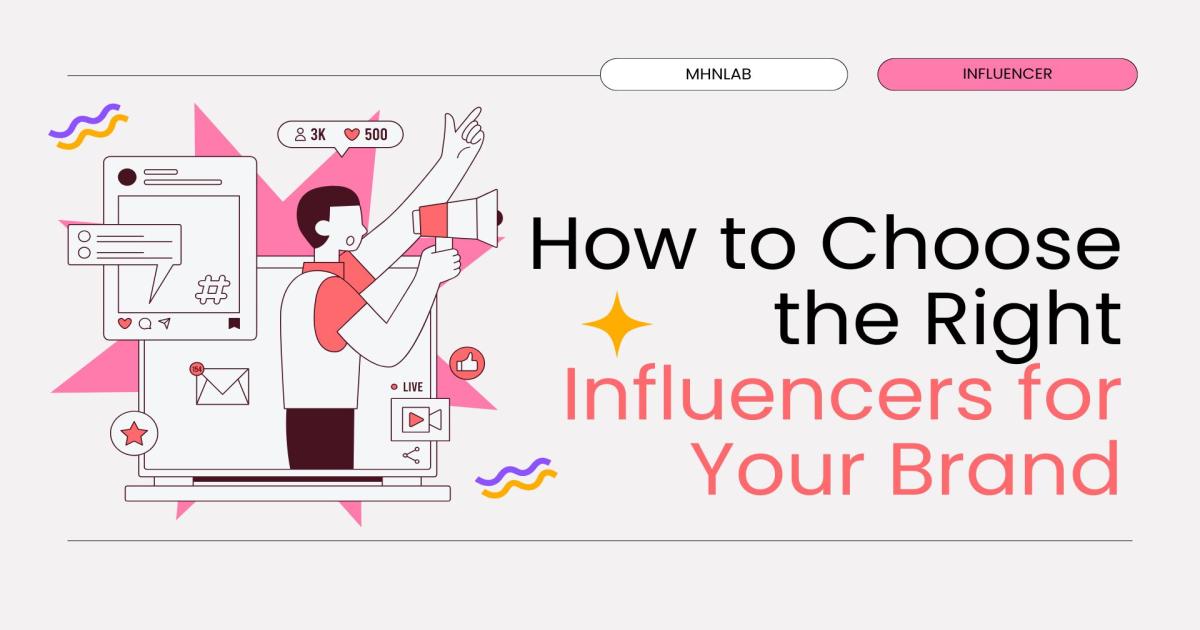Influencer marketing has become one of the most effective ways to promote your brand. By collaborating with influencers who have a loyal and engaged audience, you can drive awareness, increase sales, and build trust with your target customers. However, choosing the right influencers is crucial for the success of your campaign. In this guide, we’ll discuss how to select the best influencers for your brand to maximize results.
1. Understand Your Brand's Goals
Before you start reaching out to influencers, it's important to clearly define your brand's goals. Are you aiming to increase brand awareness, drive traffic to your website, or boost sales of a specific product? Knowing your objectives will help you identify the type of influencer who is best suited to your campaign.
- Brand Awareness: If your goal is to introduce your brand to a larger audience, look for influencers with a broad reach and high engagement.
- Conversions and Sales: If you want to drive sales, consider partnering with influencers who can deliver targeted traffic and have a strong connection with their audience.
- Content Creation: If you need help creating high-quality content, collaborate with influencers who are known for their creativity and strong visual presence.
2. Define Your Target Audience
Choosing the right influencers also depends on your target audience. Think about who your ideal customers are and what kind of influencers they follow. This will help you find influencers who cater to a similar demographic and whose followers are likely to be interested in your brand.
- Age, Gender, and Location: Ensure that the influencer’s audience matches the key demographic characteristics of your target market.
- Interests and Behavior: Choose influencers who share content relevant to your product or service. This ensures their audience will be more likely to engage with your brand.
- Engagement Rate: It's not just about the number of followers. High engagement (likes, comments, shares) is a strong indicator of a loyal and interested audience.
3. Evaluate the Influencer’s Content Quality
The content an influencer creates should align with your brand’s values and aesthetic. Take the time to review their past content to ensure that it resonates with your target audience and reflects the type of image you want to promote for your brand.
- Visual Appeal: The influencer’s content should be visually appealing and fit with the style and quality of your brand.
- Authenticity: Check if the influencer’s content feels authentic and not overly promotional. Audiences tend to connect more with influencers who are genuine and share personal stories.
- Consistency: Evaluate how consistent the influencer is with posting and whether they maintain a cohesive brand image across different platforms.
4. Assess the Influencer’s Engagement and Reach
While an influencer’s follower count is important, engagement rate is often a better indicator of how effectively they can connect with their audience. High engagement means the influencer’s followers are likely to trust their recommendations and take action.
- Engagement Rate: Calculate the average number of likes, comments, and shares relative to the influencer’s followers. A higher engagement rate often leads to better campaign performance.
- Reach vs. Engagement: A balance between reach and engagement is ideal. Don’t just focus on big influencers with millions of followers—micro-influencers with fewer followers often have more engaged audiences.
- Audience Interaction: Look at how the influencer interacts with their followers. Are they responding to comments and engaging in conversations?
5. Analyze the Influencer’s Authenticity and Reputation
It’s important to work with influencers who have a trustworthy reputation. Partnering with an influencer who has been involved in scandals or is known for inauthentic behavior can harm your brand's reputation. Take the time to research their background and online persona.
- Reputation in the Industry: Look at the influencer’s overall reputation in the industry and whether they align with your brand values.
- Past Partnerships: Check out the brands they’ve previously worked with. Are they similar to your brand in terms of values and target audience?
- Audience Trust: Influencers with a high level of audience trust can generate more effective and meaningful conversions for your brand.
6. Review the Influencer’s Past Campaigns
Examining the influencer’s past collaborations will give you insight into how they have worked with other brands and what kind of results they’ve achieved. Look at the content they’ve created for previous campaigns, the engagement they’ve received, and how well it aligns with your brand.
- Successful Campaigns: Check whether the influencer has run successful campaigns in the past. If they have, chances are they can help deliver great results for your brand.
- Content Formats: Evaluate the types of content the influencer has created—such as sponsored posts, reviews, or giveaways—and determine if these formats align with your campaign needs.
- Brand Fit: Make sure the influencer has promoted brands similar to yours in terms of product type and audience.
7. Establish Clear Expectations
Once you’ve chosen the right influencers, it’s important to set clear expectations for the campaign. Discuss your goals, key performance indicators (KPIs), and any specific deliverables you expect from the influencer. Be sure to have a contract or agreement in place to ensure mutual understanding and accountability.
- Campaign Goals: Clearly communicate what you want to achieve with the campaign, whether it’s brand awareness, lead generation, or sales.
- Content Guidelines: Provide influencers with any necessary guidelines for how you want your brand to be represented in their content.
- Compensation: Discuss the compensation structure, whether it’s a flat fee, commission, or product-based incentives.
Conclusion
Choosing the right influencers for your brand is essential for the success of your marketing campaign. By considering factors such as audience alignment, content quality, engagement rates, and the influencer’s reputation, you can make informed decisions that lead to increased brand awareness, trust, and conversions. Keep these tips in mind when selecting influencers to ensure that your collaborations are mutually beneficial and drive the desired results for your brand.





